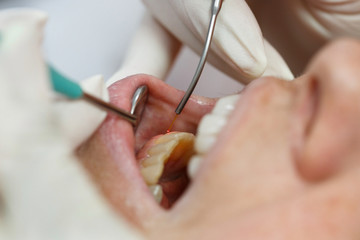
Gums Procedure There are several different procedures that may be referred to as "gum procedures." These procedures are generally performed by a dental professional and are designed to improve the health and appearance of the gums.
Introduction?
Gums Procedure One common gum procedure is deep cleaning, also known as scaling and root planing. This procedure is used to remove plaque and tartar from below the gum line, as well as to smooth the surfaces of the roots of the teeth to help prevent the re-formation of plaque and tartar.
Another common gum procedure is gum surgery. This may be necessary if the gums are severely infected or if they have receded significantly. Gum surgery can involve a range of procedures, including gingival flap surgery, bone grafting, and tissue grafting.
Gum procedures may also be used to treat gum disease, such as gingivitis or periodontitis. These procedures may include the use of medications, such as antibiotics, to help reduce inflammation and kill bacteria in the gums.
It is important to maintain good oral hygiene and see a dental professional regularly to prevent the need for gum procedures. If you have concerns about your gums or think you may need a gum procedure, it is important to speak with a dental professional for a proper evaluation and treatment plan.
What Is Gums Procedure:
A gum procedure is a type of dental treatment that is focused on improving the health and appearance of the gums. There are several different types of gum procedures that may be performed, depending on the specific needs of the patient.
One common gum procedure is a deep cleaning, also known as scaling and root planing. This procedure involves removing plaque and tartar from below the gum line and smoothing the surfaces of the roots of the teeth. Deep cleaning is often recommended for patients with gum disease, such as gingivitis or periodontitis, as a way to remove bacteria and reduce inflammation in the gums.
Another common gum procedure is gum surgery. This may be necessary if the gums are severely infected or if they have receded significantly. Gum surgery can involve a range of procedures, including gingival flap surgery, bone grafting, and tissue grafting.
Gum procedures may also involve the use of medications, such as antibiotics, to help reduce inflammation and kill bacteria in the gums. These procedures may be performed by a dental professional, such as a dentist or periodontist.
It is important to maintain good oral hygiene and see a dental professional regularly to prevent the need for gum procedures. If you have concerns about your gums or think you may need a gum procedure, it is important to speak with a dental professional for a proper evaluation and treatment plan.
What We Should Know About Gums Procedure:
Here are some things you should know about gum procedures:
-
Gum procedures are designed to improve the health and appearance of the gums. They may be necessary if the gums are severely infected or if they have receded significantly.
-
Common gum procedures include deep cleaning (scaling and root planing), gum surgery, and the use of medications to reduce inflammation and kill bacteria in the gums.
-
Gum procedures may be performed by a dental professional, such as a dentist or periodontist.
-
It is important to maintain good oral hygiene and see a dental professional regularly to prevent the need for gum procedures.
-
If you have concerns about your gums or think you may need a gum procedure, it is important to speak with a dental professional for a proper evaluation and treatment plan.
-
Gum procedures may be uncomfortable, but they are generally safe and effective when performed by a trained dental professional.
-
After a gum procedure, it is important to follow the instructions of your dental professional to ensure proper healing and to prevent further gum problems. This may include maintaining good oral hygiene, avoiding certain foods or activities, and taking any prescribed medications.
Cons:
Gum procedures are generally safe and effective when performed by a trained dental professional. However, as with any medical procedure, there are potential risks and complications that may occur.
Some potential risks and complications of gum procedures include:
- Pain or discomfort during or after the procedure
- Bleeding during or after the procedure
- Swelling or inflammation of the gums
- Infection of the gums or teeth
- Damage to teeth or surrounding tissues
- Allergic reactions to medications or materials used during the procedure
It is important to discuss the potential risks and complications of a gum procedure with your dental professional before the procedure is performed. They will be able to provide you with more specific information about the risks and complications associated with the specific procedure you are considering.
It is also important to follow the instructions of your dental professional after the procedure to ensure proper healing and to minimize the risk of complications. This may include maintaining good oral hygiene, avoiding certain foods or activities, and taking any prescribed medications.
Conclusion:
In conclusion, gum procedures are a type of dental treatment that is designed to improve the health and appearance of the gums. There are several different types of gum procedures that may be performed, including deep cleaning (scaling and root planing), gum surgery, and the use of medications to reduce inflammation and kill bacteria in the gums. Gum procedures may be necessary if the gums are severely infected or if they have receded significantly.
Gum procedures are generally safe and effective when performed by a trained dental professional. However, as with any medical procedure, there are potential risks and complications that may occur. It is important to discuss the potential risks and complications of a gum procedure with your dental professional before the procedure is performed and to follow their instructions after the procedure to ensure proper healing and to minimize the risk of complications.
Maintaining good oral hygiene and seeing a dental professional regularly can help prevent the need for gum procedures. If you have concerns about your gums or think you may need a gum procedure, it is important to speak with a dental professional for a proper evaluation and treatment plan.

If you want to get amazing benefits by using this link

